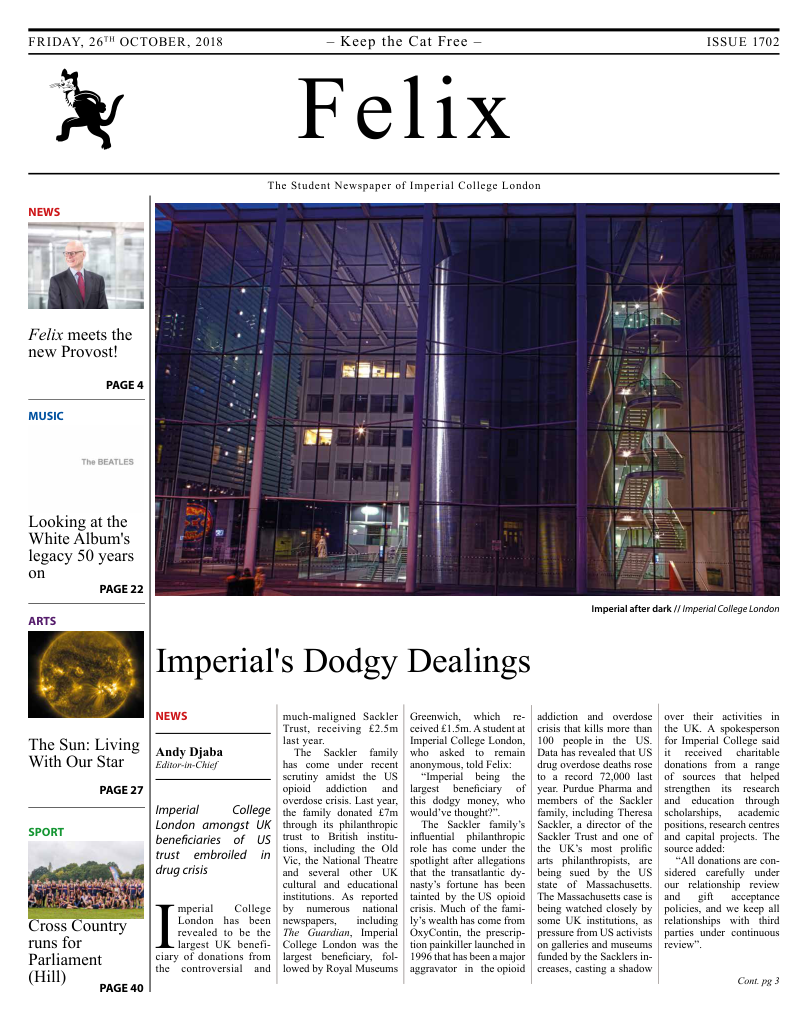Everybody wants to change the world: Looking at the White Album’s Legacy 50 Years on

Exactly fifty years ago, the year 1968 was to be the beginning of the end for the Beatles. Lennon had finally escaped the clutches of chronic acid tripping, partly due to his burgeoning love for Yoko Ono, partly due to the retreat the band made to Rishikesh where they were meant to have sworn off drugs forever in favour of transcendental meditation. But while the trip to India had given them new spiritual élan and innumerable new acoustic material due to the technological limitations of living in the foothills of the Himalayas, all was not well when they returned to the studio. Many of the recording sessions were tense, with Lennon and McCartney often pulling in opposite directions, while Ringo even quit the band for a short while to go chill out on a boat in Sardinia (the hiatus yielding one of my favourite Beatles songs, ‘Octopus’s Garden’).
Although the spirit of The Beatles, their penultimate “proper” album, was borne out of the spirit of revolution, the songs bearing that name show that they were not completely in tune with what the world had in mind. The French student protests, MLK’s death, and the Vietnam protests meant that the counterculture had a new urgency which would, almost a decade later, lead to the punk counterpunch to flower power. But Lennon’s cheeky treading on both sides of the issue “But when you talk about destruction // Don’t you know that you can count me out (in)” shows that the Beatles were not ready to put their full weight behind the aggression brewing in the air. This may have garnered accusations from both the radical left – “elitist nonchalance in light of injustice” – and the radical right – “Maoists in disguise condoning the red apocalypse” – but they remained unmoved, perhaps helped by them having quit touring. What they would do instead of bowing to political pressures, was produce an album more varied than anything they’d made before, using it to show that the virtue of music can transcend earthly chaos.
Continuing in the tradition of all their efforts from Help!, the monstrous 95-minute double album kicks off on an unexpectedly fast thumper of a song. The tongue-in-cheek ‘Back in the U.S.S.R.’, which had the working title ‘I’m backing the U.S.S.R.’, incited enough outrage as it was, pissing off almost as many as Lennon’s famous quip about the band being bigger than Jesus. His arrogance may have been justified by their past three albums, but the opener on this one lacks the grandiosity to do so, perhaps giving a jet-engine-roar-tinged glimpse at why many doubt this album.
The mix of songs is almost kaleidoscopic. Many are either stories recounting Rishikesh drama (‘Dear Prudence’, ‘Sexy Sadie’) or echoes of their folky guitar-picking in the Indian north, like ‘Wild Honey Pie’, ‘Mother Nature’s Son’, ‘Julia’ and ‘Blackbird’. The last two are Lennon’s and McCartney’s respective odes to the opposite sex; ‘Julia’ being Lennon’s way of telling his mother that he has finally replaced her with Yoko, while ‘Blackbird’ was McCartney’s way of showing empathy for the civil rights movement and helped him win his future wife’s heart the first time she came to his house. ‘Blackbird’ is an especially impressive piece as it was recorded and mixed in six hours. The poignant simplicity of it only underlines McCartney’s genius and single-mindedness.
While many claim that the mixed bag of songs to have found themselves on the album are the reason why it cannot be counted amongst their best, I am inclined to disagree. The uniqueness of the songs means that one can pick out any one of them for a single listen and not feel like they’re missing out. Despite their ability to be stand-alone listens, the whole that they form is still somewhat coherent, if not entirely free-flowing, and offers an important insight into a confusing time for the band. Even the songs that many love to hate, be it the hard-edged attempts by the foursome to keep up with the heavier, screeching sounds springing up from the UK underground in the late 60s, like ‘Helter Skelter’ (which helped set off Manson’s killing spree in sunny California) and ‘While My Guitar Gently Weeps’ (featuring hard rock’s morally contentious daddy, Eric Clapton), or the sugary nonsense of ‘Ob-La-Di Ob-La-Da’ (a song loved both by me and Murakami, isn’t that an esteemed fanbase), ‘Rocky Raccoon’ (who doesn’t enjoy a wild west love story) and ‘Honey Pie’ (a warm-soup-like feel-good song in the vein of ‘When I’m Sixty Four’), are some of my favourite Beatles songs to listen to.
An unfair criticism levelled at the album is that all the songs are too simple and complete nonsense. ‘Happiness Is A Warm Gun’ stands out as an incredibly complex and powerful song. The lyrics on ‘Glass Onion’ are at once revealing and completely opaque (a Lennon trademark), while ‘Revolution 9’ was something very revolutionary in music indeed – Ono’s influence was responsible for this piece which brought the concept of “random”, Dada-like collage art into music. Oh, and it also features Ringo’s first composition for the band, ‘Don’t Pass Me By’.
The album that developed from a single jam session which was half an hour long and powerful enough to spawn two songs (Revolutions 1 and 9), proves that the Beatles were still able to produce magic even when at odds with each other, drugged out (the drug hiatus only lasted while in Rishikesh; Lennon actually ended up on heroin), and out of favour with the hysterical political youth. If even their gibberish ad-libs can have this kind of pop-culture influence, it only shows why they are the greatest of all time.







